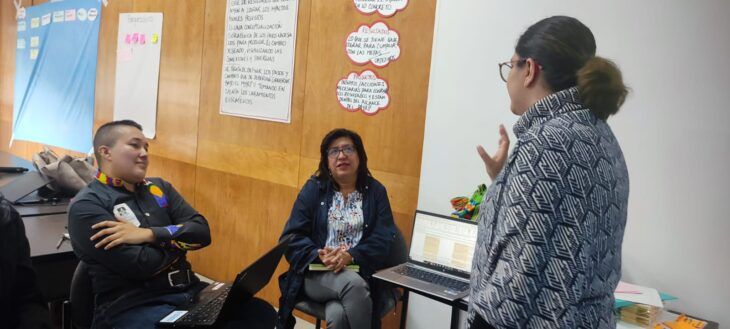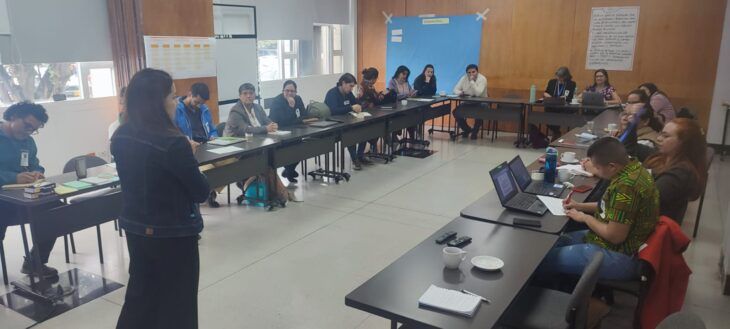Blog
Monica Cortes on inclusive education in crisis in Colombia and Niger
- Inclusive education
- The Americas
- Africa
Inclusion International and the International Disability Alliance (IDA) are working together on a project funded by Education Cannot Wait (ECW) called: “Accelerating quality inclusive equitable education in emergency for girls and boys with disabilities through partnerships with OPDs including pilot interventions in Niger and Colombia”.
The project officially began in early 2024, following a six-month planning period in 2023.
In this blog post, we delve into Monica Cortes’ role as the National Project Manager in Colombia and her experiences during the initial months of the ECW funded project.
The project focuses on promoting inclusive education during emergency situations in Colombia and Niger.
This project aims to use the expertise of Organisations of Persons with Disabilities (OPDs) at the local, national, regional, and global levels to harness the collective knowledge of the disability movement and connected OPDs and humanitarian actors (HAs) to build sustainable platforms to foster inclusivity in Education in Emergencies (EiE) in Niger and Colombia.
A crucial aspect of this collaboration has been ensuring that underrepresented groups of persons with disabilities are adequately supported to participate in project activities and advocacy efforts from the outset.
Monica Cortes, Asdown Colombia
Our local project partners include ASDOWN Colombia (a member of Inclusion International) and the Federation Nigerienne de Personnes Handicappées (a member of the African Disability Forum).
Each organisation hosts a national Project Manager and a national Project Assistant, facilitating coordination of inputs from the cross-disability movement into the project.

The first year of the project primarily focused on strengthening the OPD movement and empowering OPDs in the respective countries to engage effectively as experts with humanitarian actors.
Monica said, “Since the inception of our Acceleration Facility project, we have been collaborating closely with the cross-disability movement in Colombia to ensure strong cooperation and mutual support throughout the project’s duration.”
“A crucial aspect of this collaboration has been ensuring that underrepresented groups of persons with disabilities are adequately supported to participate in project activities and advocacy efforts from the outset. This involved preparatory workshops and providing necessary information to underrepresented groups well in advance of initial meetings and activities.”
She further added, “It has also been imperative to inform OPDs about the existence and significance of this initiative, emphasising the importance of addressing the needs of persons with disabilities affected by humanitarian crises, who have often been overlooked.”
Simultaneously, efforts were made to support and connect with other project grantees in Colombia and Niger with active participation from our National Project Teams.
Collaboration with colleagues in Niger provides diverse perspectives on the crisis and inclusion in education, fostering creativity in strategic planning.
Monica Cortes, Asdown Colombia
Monica Cortes reflected on coordinating the ECW-supported initiative in Colombia as an opportunity to highlight the impact of protracted humanitarian crises on the education of children with disabilities.
“Participation with ECW has provided a platform to identify barriers and obstacles faced by children, especially girls, with disabilities in accessing inclusive education during emergencies. We can leverage insights from our movement and grassroots communities to contribute to finding inclusive solutions.”
Monica also noted, “A significant achievement within a short timeframe has been securing the commitment of entities such as INCI and INSOR, which focus on visually and hearing impaired populations, to prioritise humanitarian crises. Their involvement underscores the importance of addressing these issues within the wider ECW grantees group in the country.”

Moreover, our Colombia and Niger partners will work together. For example, the organisations are currently developing data collection tools to better understand the challenges faced by families and children with disabilities, and opportunities within the humanitarian NGOs sector.
Monica emphasised it was important to work closely with colleagues in Niger, stating, “Collaboration with colleagues in Niger provides diverse perspectives on the crisis and inclusion in education, fostering creativity in strategic planning.”
These data collection tools will be reviewed by project advisory groups, including the Catalyst for Inclusive Education, ensuring representation and participation of underrepresented groups throughout the process.
We now have the opportunity to translate advocacy into action, and with a strong cross-disability group, we are poised to make a meaningful impact.
Monica Cortes, Asdown Colombia
Monica concluded, “After advocating for meaningful engagement for a considerable time, this project marks a significant step towards realising inclusive education for children with disabilities in emergencies.”
“We now have the opportunity to translate advocacy into action, and with a strong cross-disability group, we are poised to make a meaningful impact. While this project sets us on the right path, sustained effort is required to ensure its long-term success.”